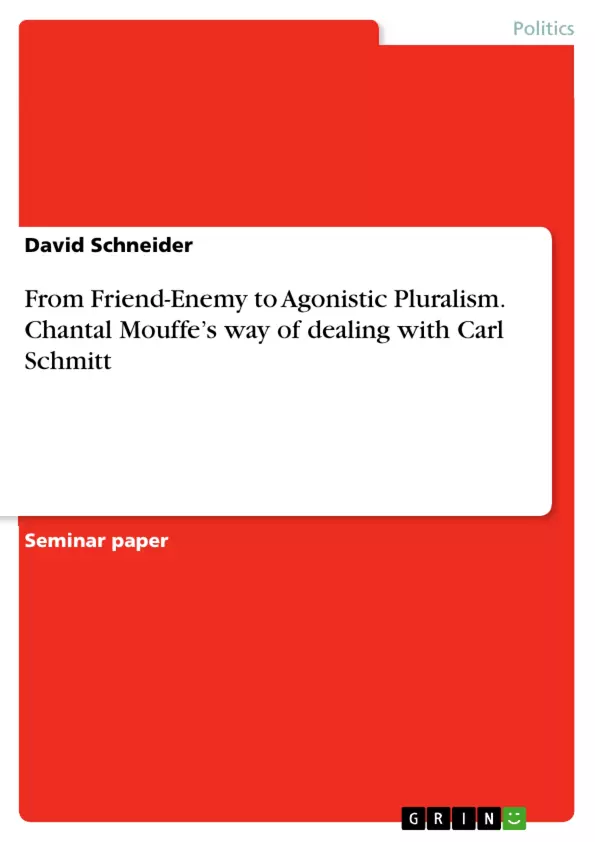Carl Schmitt is not only known for his remarkable influence on 20th century legal and political theory, but also for his close allegiance with Nazism. Whereas some say that his Nazi experience can’t be separated from his ideas, it is even more surprising that radical democrat Chantal Mouffe comes up with a way of using Schmitt’s ideas to rethink contemporary politics. Her reflection on and modification of Schmitt’s friend-enemy distinction led her to a friend-adversary distinction that underlies her notion of agonistic pluralism. The aim of this essay is to outline in what way Mouffe’s account of agonistic pluralism resembles Schmitt’s friend-enemy distinction. First, we have a look on Schmitt’s friend-enemy distinction. Then, we will focus on Chantal Mouffe’s modification of Schmitt’s distinction and mention besides widely discussed commonalities and differences between her and Schmitt’s conception a difference that until now hasn’t received much attention in the literature: the different accounts of the preferred location of the friend’s opponent. In the last part of this essay, a weakness that both conceptions share and that until now didn’t receive the attention it deserves, will be presented, namely their failure to recognize that friend-opponent distinctions are not necessarily tied to membership of a certain political entity. In the last paragraph, possible implications of this weakness on the relationship between Schmitt’s and Mouffe’s friend-opponent distinctions and cosmopolitanism will be outlined.
Table of Contents
- From Friend-Enemy to Agonistic Pluralism. Chantal Mouffe's way of dealing with Schmitt
- Schmitt's Friend-Enemy Distinction
- Chantal Mouffe's Modification of Schmitt's Distinction
- The Preferred Location of the Friend's Opponent
- The Weakness of Both Conceptions
Objectives and Key Themes
This essay aims to analyze how Chantal Mouffe's concept of agonistic pluralism relates to Carl Schmitt's friend-enemy distinction. The essay examines the similarities and differences between the two conceptions, including the intensity of the friend-opponent distinction, the preferred location of the opponent, and the limitations of both concepts.
- The relationship between Schmitt's friend-enemy distinction and Mouffe's agonistic pluralism
- The role of antagonism and agonism in political theory
- The concept of the political enemy and its implications for international relations
- The tension between internal pluralism and external unity in political thought
- The potential for cosmopolitanism in light of Schmitt's and Mouffe's friend-opponent distinctions
Chapter Summaries
- From Friend-Enemy to Agonistic Pluralism: This section introduces the topic and provides a brief overview of Carl Schmitt's influence on political theory, Chantal Mouffe's reinterpretation of Schmitt's work, and the main points of the essay.
- Schmitt's Friend-Enemy Distinction: This chapter delves into Schmitt's concept of the political, explaining how he defines the political through the friend-enemy distinction. The chapter explores the implications of this distinction for political entities, the nature of the political enemy, and the objective and autonomous character of the political.
- Chantal Mouffe's Modification of Schmitt's Distinction: This chapter focuses on Mouffe's concept of agonistic pluralism, contrasting it with Schmitt's friend-enemy distinction. It explores the difference in intensity between the two conceptions, discusses the notion of mutual recognition, and analyzes the implications of agonistic conflict for democratic institutions.
- The Preferred Location of the Friend's Opponent: This section analyzes the different perspectives on the preferred location of the friend's opponent in Schmitt and Mouffe's theories. While Schmitt emphasizes the importance of an external enemy for internal unity, Mouffe argues for internal pluralism and external agonism.
- The Weakness of Both Conceptions: This chapter discusses the shared weakness of both conceptions: their failure to recognize that friend-opponent distinctions can transcend political entities. The chapter explores the implications of this limitation for cosmopolitanism and the potential for a world state.
Keywords
The main keywords and focus topics of this essay are: friend-enemy distinction, agonistic pluralism, political theory, Carl Schmitt, Chantal Mouffe, antagonism, agonism, political enemy, internal pluralism, external unity, cosmopolitanism, democracy, state, international relations.
Frequently Asked Questions
What is Chantal Mouffe's "Agonistic Pluralism"?
It is a political theory that views conflict not as something to be eliminated, but as a vital part of democracy, transforming "enemies" into "adversaries."
How does Mouffe differ from Carl Schmitt?
While Schmitt defines politics through the "friend-enemy" distinction (often leading to war), Mouffe modifies this into a "friend-adversary" relationship within a democratic framework.
What is the "friend-enemy" distinction in Schmitt's theory?
For Schmitt, the "political" is defined by the maximum degree of intensity of an association or dissociation, specifically the ability to distinguish between friend and foe.
What is a shared weakness of Schmitt and Mouffe's theories?
Both fail to recognize that friend-opponent distinctions are not necessarily tied to membership in a specific political entity or state.
Why is Mouffe's work surprising given Schmitt's Nazi ties?
It is notable because Mouffe, a radical democrat, uses the ideas of a controversial conservative thinker to rethink and strengthen contemporary democratic politics.
- Quote paper
- David Schneider (Author), 2017, From Friend-Enemy to Agonistic Pluralism. Chantal Mouffe’s way of dealing with Carl Schmitt, Munich, GRIN Verlag, https://www.grin.com/document/385492



